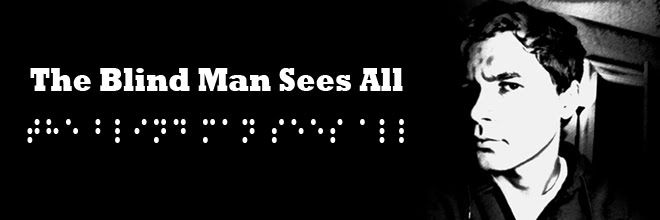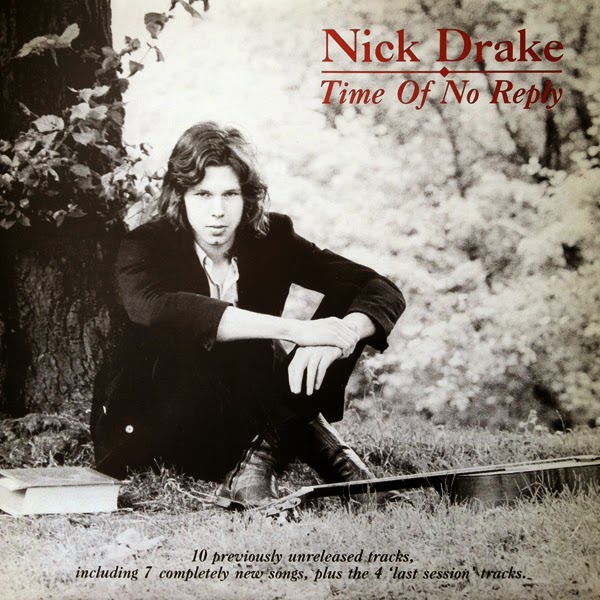Tracks listed in bold are exclusive to the album under whose title they are listed.
Before his death in 1974, Drake recorded three note-perfect studio albums: Five Leaves Left, Bryter Layter, and Pink Moon. During his lifetime, an eponymous compilation album was also released, featuring only tracks from the first two studio albums. As of June 2015, there have been 9 posthumous releases. Of those nine, four - Fruit Tree, Heaven in a Wildflower, Way to Blue, and Tuckbox - do not feature any exclusive tracks. (These are discussed at the end of the post.) Details of the remaining five are as follows:
Time of No Reply was released in 1986, and is the only posthumous album of Nick Drake's to feature a full length album's worth of music that had never been officially released before. The majority of the album dates back to the Five Leaves Left sessions or before, including songs that didn't make the cut, demo versions of some that did, and an alternate arrangement of "Thoughts of Mary Jane." It then concludes with four of the five songs Drake recorded in his abortive 1974 recording session. ("Tow the Line" was not discovered on the reel until later, and therefore was not included.)
Made to Love Magic was released in 2004 and is the successor to Time of No Reply. It features 13 tracks instead of 14: gone are "Man in a Shed," "Fly," "Been Smoking Too Long," and "Strange Meeting II," in favor of demos of "River Man" and "Three Hours," plus the aforementioned "Tow the Line." All of the tracks are remastered, and the difference in sound quality is dramatic. Of the 10 tracks that overlap with Time of No Reply, only 5 are identical to the versions found on that album: "Joey," "Thoughts of Mary Jane," "Clothes of Sand," "Black Eyed Dog," and "Voices" (whose title has changed from "Voice from the Mountain"). Of the remaining tracks, "Rider on the Wheel" has received a new stereo mix, but is otherwise the same as the preceding version. "Magic" (again, a retitling of "I Was Made to Love Magic") and "Time of No Reply" have newly-recorded arrangements by Robert Kirby, written for the Five Leaves Left recording session but abandoned when those tracks were omitted from the debut album. The remaining two tracks, "Mayfair" and "Hanging on a Star," are alternate versions of those found on Time of No Reply.
Family Tree was released in 2007 and contains 28 tracks. These are mostly early demo recordings, several of which feature other members of his family. Of these, only two are versions of songs found on his studio albums - demos of "Day Is Done" and "Way to Blue" - both, again, from Five Leaves Left. The opening track is a snippet of "Come Into the Garden," a different take of which is presented in full later in the album. Two of the tracks are versions of demos found on Time of No Reply: "Been Smoking Too Long" is ostensibly the same recording, while "Strange Meeting II" is an alternate version that includes brief commentary on the song before and after, as well as a laugh and a few inconspicuously muffed lyrics during the performance. The remaining 22 pieces are entirely unique within Drake's officially released output.
A unique wrinkle in the picture is provided by A Treasury, which was released alongside Made to Love Magic in 2004. It mostly serves (respectably enough) as a greatest hits collection, featuring "Magic" and "Black Eyed Dog" alongside 13 tracks from the studio albums. One UK-only version of the album contains a 50 second long version of "Plasir d'Amour" as a hidden track, never released anywhere else. Rather irritatingly, then, this snippet marks the only part of the official discography not readily accessible to American audiences. In the name of due diligence, I bought a British copy of A Treasury, but when the CD arrived from London, it too contained only 15 tracks. "Plasir d'Amour" can be heard on YouTube and has been found on Rapidshare.
[Edit added 6/2/2015]: The final piece of the puzzle, to date, is The John Peel Session. Drake recorded five songs for Peel's famous radio show on August 5, 1969. These unique recordings of otherwise available songs were unreleased until 2014, when they were bundled with the special edition of the authorized biography Remembered for a While. Later in 2014, the songs were released digitally for standalone purchase from British online retailers, though a clerical error rendered them unavailable for purchase in the US. I alerted the Drake estate to the malfunction, and 2 weeks later, they were at long last made available for sale on Amazon and iTunes.
* * *
Summary: Acquiring the three studio albums, Made to Love Magic, and Family Tree (or else Tuckbox, which contains all 5 of these albums) will give you all but 14 officially released Nick Drake recordings. Adding Time of No Reply and The John Peel Session fills in 13 of the missing 14; the last is found on the UK-only version of A Treasury (see above).
* * *
[On those final 3 otherwise undescribed compilations: Heaven in a Wildflower contains 14 tracks from the studio albums. Way to Blue contains 16 tracks from the studio albums and Time of No Reply; it differs by 4 tracks from A Treasury, and is generally better-selected, though it was never remastered and lacks the rare bonus track. Fruit Tree is a compilation that reincarnated 3 times: first as a studio album collection with the first 4 recordings from 1974 appended to the end of Pink Moon, then as the studio albums plus Time of No Reply, and finally as the studio albums plus the Nick Drake documentary A Skin Too Few. With the 2013 release of Tuckbox, it seems likely that Fruit Tree has been supplanted. The only negative consequence of this is that A Skin Too Few, which has never been released anywhere else, seems destined to become unavailable; for now, though, like "Plasir d'Amour," it can be found on YouTube.]






